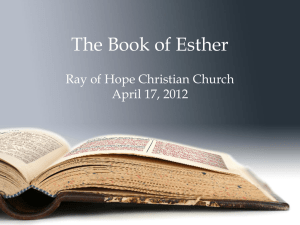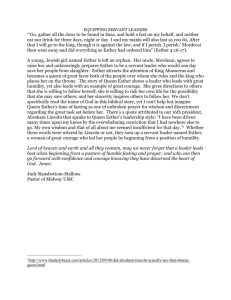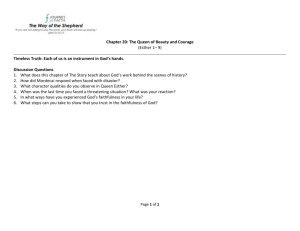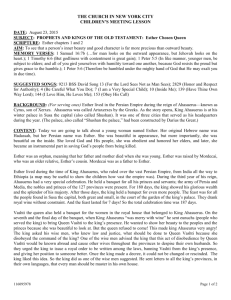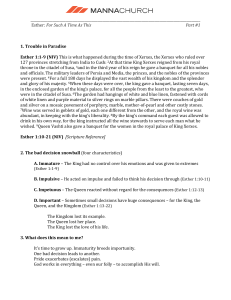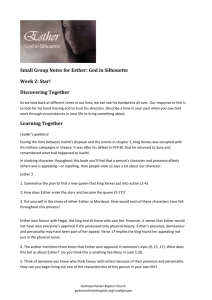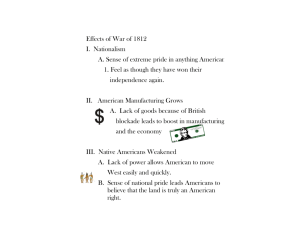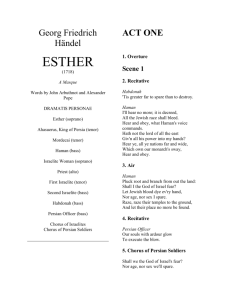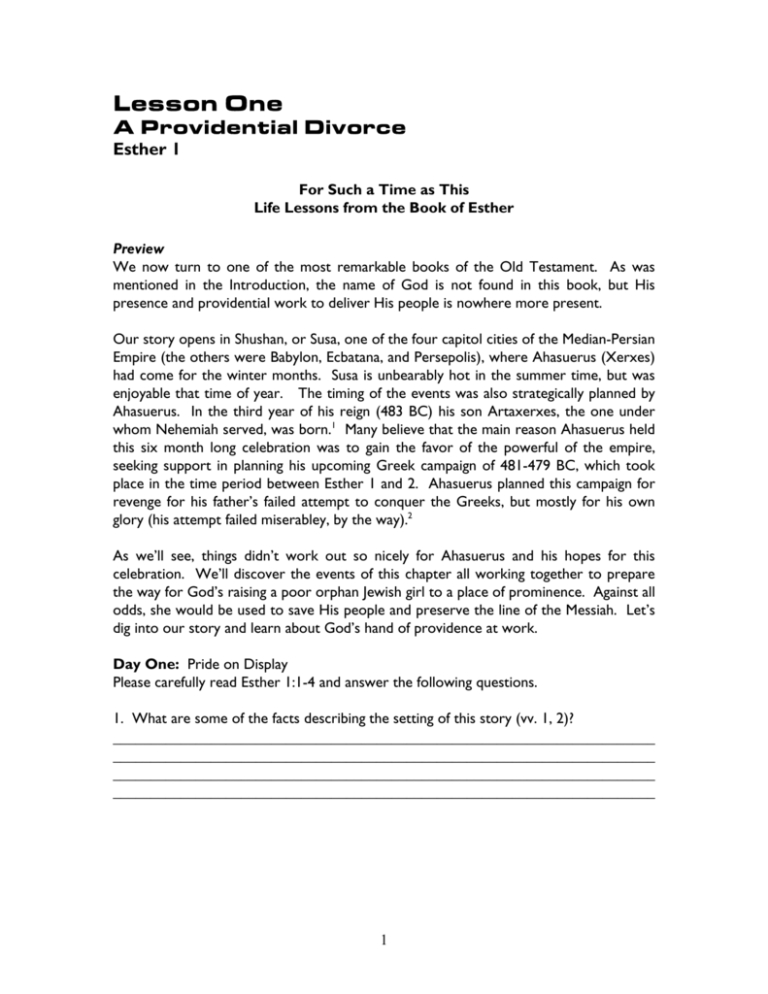
Lesson One
A Providential Divorce
Esther 1
For Such a Time as This
Life Lessons from the Book of Esther
Preview
We now turn to one of the most remarkable books of the Old Testament. As was
mentioned in the Introduction, the name of God is not found in this book, but His
presence and providential work to deliver His people is nowhere more present.
Our story opens in Shushan, or Susa, one of the four capitol cities of the Median-Persian
Empire (the others were Babylon, Ecbatana, and Persepolis), where Ahasuerus (Xerxes)
had come for the winter months. Susa is unbearably hot in the summer time, but was
enjoyable that time of year. The timing of the events was also strategically planned by
Ahasuerus. In the third year of his reign (483 BC) his son Artaxerxes, the one under
whom Nehemiah served, was born.1 Many believe that the main reason Ahasuerus held
this six month long celebration was to gain the favor of the powerful of the empire,
seeking support in planning his upcoming Greek campaign of 481-479 BC, which took
place in the time period between Esther 1 and 2. Ahasuerus planned this campaign for
revenge for his father’s failed attempt to conquer the Greeks, but mostly for his own
glory (his attempt failed miserabley, by the way).2
As we’ll see, things didn’t work out so nicely for Ahasuerus and his hopes for this
celebration. We’ll discover the events of this chapter all working together to prepare
the way for God’s raising a poor orphan Jewish girl to a place of prominence. Against all
odds, she would be used to save His people and preserve the line of the Messiah. Let’s
dig into our story and learn about God’s hand of providence at work.
Day One: Pride on Display
Please carefully read Esther 1:1-4 and answer the following questions.
1. What are some of the facts describing the setting of this story (vv. 1, 2)?
________________________________________________________________________
________________________________________________________________________
________________________________________________________________________
________________________________________________________________________
1
2. What did Ahasuerus decide to do at this time, and for whom (v. 3)?
________________________________________________________________________
________________________________________________________________________
________________________________________________________________________
________________________________________________________________________
3. What types of things did he do during this six month celebration (v. 4)?
________________________________________________________________________
________________________________________________________________________
________________________________________________________________________
________________________________________________________________________
Note: Ahasuerus had inherited a tremendous fortune from his father, Darius I, and had
his treasures on display for 180 days. The seven day banquet mentioned in the next
section culminated this celebration.3 As many as 15, 000 people were entertained at
Persian banquets; one Assyrian king had a ten day feast for 69,574!4
4. The purpose of this extravaganza becomes more obvious through the word
meanings in v. 4. The word showed meant to make others see and understand
something; glorious had poetically been used to describe the soul of something.5
Ahasuerus was trying to get them to see and understand his power, the very soul of
himself and his kingdom by this “tremendous display of the opulent wealth and glory of
his empire” (NLT). Ahasuerus lived for his possessions, passions, and pride. How does
1 John 2:15-17 warn about the danger of living for this world and what it has to offer?
What warning is also found about prideful people in Proverbs 16:18-19?
________________________________________________________________________
________________________________________________________________________
________________________________________________________________________
________________________________________________________________________
________________________________________________________________________
________________________________________________________________________
5. We need to ask ourselves whether we are living for the things of this world, or are
we living for God’s kingdom? What does Mark 8:36, 37 and Luke 16:13 warn us about
this? What should we be pursuing instead (Ephesians 1:18-20)?
________________________________________________________________________
________________________________________________________________________
________________________________________________________________________
________________________________________________________________________
________________________________________________________________________
________________________________________________________________________
2
Scripture Memory: This week we will be memorizing 1 John 2:15-16. Review
the passage several times throughout the day each day this week, and by the end of the
week, you should have it memorized completely.
Do not love the world or the things in the world. If anyone loves the world, the
love of the Father is not in him. For all that is in the world the lust of the flesh, the lust
of the eyes, and the pride of life is not of the Father but is of the world.
I John 2:15, 16 (NKJV)
Day Two: Party Hardy!
Please carefully read Esther 1:5-8 and answer the following questions.
1. How did Ahasuerus wrap up this celebration, and where did this take place (v. 5)?
________________________________________________________________________
________________________________________________________________________
________________________________________________________________________
________________________________________________________________________
Note: Persian palaces usually stood in the middle of a park with lovely gardens. When
the Old Testament was translated into Greek in the Septuagint, the word used for
garden was paradeisos, where we get our word paradise.6 Jesus used this word when He
told the thief on the cross, “today you will be with Me in Paradise” (Luke 23:43).
2. Describe the opulent display and extent that Ahasuerus went to lure those attending
the feast (v. 6, 7). Probably not like your most recent back yard barbecue!
________________________________________________________________________
________________________________________________________________________
________________________________________________________________________
________________________________________________________________________
Note: Ahasuerus’ goal in all this was to sell his plans to the people. The Persian custom
was to entertain and do business at the same time, like a salesman might take a
prospective client out to an expensive dinner. “A proud man himself, he knew how to
appeal to the pride in others.”7
3. The focus of this feast was alcohol. The Septuagint translation here confirms that
this was a potos, a drinking party.8 What was the extent of the wine Ahasuerus
provided, and what was the Persian drinking law (v. 8)?
________________________________________________________________________
________________________________________________________________________
________________________________________________________________________
________________________________________________________________________
3
Note: Verse 8 is difficult to translate. It is hard to tell by comparing other translations
whether it means no-one had to drink if they didn’t want to (NKJV, AMP), or they were to
drink but chose what extent they did drink (NIV, NLT). The Hebrew words for not
compulsory mean there was no social or royal compulsion to do this.9
4. In our studies in Ecclesiastes, we read there is nothing wrong with enjoying
ourselves, having a good time as a reward for our labor, for it is the gift of God
(Ecclesiastes 2:24, 3:22, 5:18-20). Many times Christians have asked if it is okay for them
to drink alcohol in view of this. This issue has been controversial and divisive, especially
in America. Ahasuerus gave liberally out of the best of his wine, but does God give us
the liberty to drink or not? When Paul went to Corinth, he faced several situations in
which he had to help the believers decide whether a particular action was right or not.
What were some of the guidelines Paul used in these passages? How can they help us
decide whether we are free to partake in some action or not?
1 Corinthians 6:12, 19, 20
________________________________________________________________________
________________________________________________________________________
________________________________________________________________________
________________________________________________________________________
I Corinthians 8:8-13
________________________________________________________________________
________________________________________________________________________
________________________________________________________________________
________________________________________________________________________
1 Corinthians 10:23, 24, 31-33
________________________________________________________________________
________________________________________________________________________
________________________________________________________________________
________________________________________________________________________
5. What specific prohibitions does the Bible have about drinking alcohol for all believers
(1 Corinthians 6:10; Ephesians 5:18), especially those in spiritual leadership (1 Timothy
3:3, Titus 1:7)?
________________________________________________________________________
________________________________________________________________________
________________________________________________________________________
________________________________________________________________________
________________________________________________________________________
________________________________________________________________________
4
Scripture Memory: Try to fill in the missing words in the blanks below, by
memory if at all possible, and then review the passage several times today.
Do not _______________ the world or the things in the world. If anyone loves
the ____________________, the love of the Father is not in him. For all that is in the
world — the lust of the ________________________, the lust of the eyes, and the
pride of life — is not of the ___________________ but is of the world.
I John 2:15, 16 (NKJV)
Day Three: Problems Sin Produces
Please carefully read Esther 1:9-12 and answer the following questions.
1. What was Queen Vashti doing during this feast (v. 9)?
________________________________________________________________________
________________________________________________________________________
Note: Her feast could have been given for all the wives of those in attendance, or
maybe the concubines.10
2. On the last day of the feast, what condition had developed (v. 10a)?
________________________________________________________________________
________________________________________________________________________
Note: We’ll see here and other places in the Book of Esther that the translators have
been very genteel in describing the events in the original Hebrew text. However, the
NLT isn’t quite so genteel; it correctly states that the king was “half drunk.”
3. In this “merry” state, what foolish command did the king give, and why (vv. 10b, 11)?
________________________________________________________________________
________________________________________________________________________
________________________________________________________________________
________________________________________________________________________
4. It is agreed by most commentators that Vashti was being commanded to come to
them wearing only her crown, or being asked to do some lewd act publicly, or possibly
she had just given birth to or was still pregnant with Artaxerxes, as mentioned already.
For whatever reason, what was Vashti’s response to this, and how did Ahasuerus react
to it (v. 12)?
________________________________________________________________________
________________________________________________________________________
________________________________________________________________________
________________________________________________________________________
5
5. Vashti knew that her refusal might mean even own death. Yet in her courage she
was able to stand against her husband’s orders. It is clear from the phrase in order to
show her beauty that Ahasuerus only wanted to make the people understand she was
another one of his possessions, to show her as if she was a piece of property. Vashti
lost her crown because of her refusal, but kept her dignity. There may come a time
where we have to make a decision like Vashti did that may cost us if we refuse. How
did the apostles set the example of making such a decision (Acts 4:19, 20; 5:29)?
________________________________________________________________________
________________________________________________________________________
________________________________________________________________________
________________________________________________________________________
________________________________________________________________________
________________________________________________________________________
Scripture Memory: Try to fill in the missing words in the blanks below, by
memory if at all possible, and then review the passage several times today.
Do not _______________ the world or the _________________________ in
the world. If anyone loves the ____________________, the love of the Father is not in
him. For all that is in the world the lust of the ________________________, the lust of
the ____________________, and the pride of life is not of the ___________________
but is of the world.
I John 2:15, 16 (NKJV)
Day Four: Proposing Foolish Solutions
Please carefully read Esther 1:13-18 and answer the following questions.
1. Ahasuerus was humiliated in front of all the people by this, and he was angry! What
help did he seek in deciding what to do about this (vv. 13, 14)?
________________________________________________________________________
________________________________________________________________________
Note: This inner circle reminds us of Daniel and others who served a similar purpose
as the wise men of Babylon. Interestingly, these seven men had instant access to the
king, while even Queen Esther couldn’t appear before him without being summoned, at
risk of death (we’ll see this in Esther 4, 5).
2. What did Ahasuerus really want to find out, and how did Memucan, one of these
men, respond to this (vv. 15, 16)?
________________________________________________________________________
________________________________________________________________________
________________________________________________________________________
________________________________________________________________________
6
3. What did Memucan assume would happen if no action was taken against the queen
because of this (vv. 17, 18)?
________________________________________________________________________
________________________________________________________________________
4. Daniel was the ultimate example of giving godly counsel to a king. It makes us
wonder what his counsel would have been if he were faced with this situation. These
men sought to oppress and control their women so they wouldn’t be despised, and to
avoid excessive disrespect and discord spreading throughout the land. Sinful anger will
always lead to foolish decisions and proposed solutions in which someone is either hurt
or denigrated. Thankfully, the pages of Scripture do much to dispel this kind of
treatment of women as mere property or sex objects to be kept under a man’s control.
The battle of the sexes began after the fall of Adam and Eve (Genesis 3:16), and will
continue until Christ returns and sets things right! But what must we all remember
about our position in Christ, and treat each other accordingly (Galatians 3:26-29)?
________________________________________________________________________
________________________________________________________________________
________________________________________________________________________
________________________________________________________________________
5. Husbands and wives have specific roles in marriage, but the husband’s role is never
to dominate or think he has to force respect from his wife. Men cannot force honor
and respect. It must be earned through a respectful, godly attitude. What are some
ways we men are to live this out (Ephesians 5:25-33)?
________________________________________________________________________
________________________________________________________________________
________________________________________________________________________
________________________________________________________________________
Scripture Memory: Try to fill in the missing words in the blanks below, by
memory if at all possible, and then review the passage several times today.
Do not _______________ the world or the _________________________ in
the world. If anyone _______________________ the ____________________, the love
of the _______________________ is not in him. For all that is in the world — the lust
of the ________________________, the lust of the ____________________, and the
___________________ of life — is not of the ___________________ but is of the
world.
I John 2:15, 16 (NKJV)
7
Day Five: A Providential Divorce
Please carefully read Esther 1:19-22 and answer the following questions.
1. What solution did Memucan offer to this problem, and what were the desired results
(vv. 19, 20)? How did he also appeal to the king’s ego and “butter him up” in this
presentation?
________________________________________________________________________
________________________________________________________________________
________________________________________________________________________
________________________________________________________________________
Note: The NLT translates the end of v. 20, “husbands everywhere, no matter their rank,
will receive proper respect from their wives!”
2. How did this idea go over (v. 21)?
________________________________________________________________________
________________________________________________________________________
3. What was the edict sent out via the Persian Pony Express (v. 22)?
________________________________________________________________________
________________________________________________________________________
Note: The Amplified Bible translates the end of v. 22, “saying that every man should
rule in his own house and speak there in the language of his own people. [If he had
foreign wives, let them learn his language.]” In other words, if their wife was from a
foreign land, they wouldn’t even be allowed to use their native language, but only speak
their husband’s language.
4. Thus Ahasuerus and Vashti were divorced. She was exiled either in the palace or
elsewhere. Thankfully, couples can’t get divorced today (yet) for one person refusing a
foolish request. Yet we take divorce much too lightly in our culture, especially in the
church where divorce rates equal or surpass the world’s. This is said to our shame!
What does God feel about divorce (Malachi 2:14-16)?
________________________________________________________________________
________________________________________________________________________
________________________________________________________________________
________________________________________________________________________
What are the biblical conditions for a believer to divorce and then remarry according to
Jesus (Matthew 5:31, 32; 19:3-9) and Paul (1 Corinthians 7:10-16)?
________________________________________________________________________
________________________________________________________________________
________________________________________________________________________
________________________________________________________________________
8
5. We can’t always understand things that happen in our lives. If these events were
recorded without connection to the rest of the story, we would see the story of a
tragic end to a marriage, but that’s all. But God was at work, using these circumstances
to prepare the way for Esther to enter the scene. What did Paul tell us about God’s
foreknowledge and providential work in us? How can we remain hopeful when we can’t
see a good outcome to our circumstances (Romans 8:28-32; II Corinthians 4:16-18)?
________________________________________________________________________
________________________________________________________________________
________________________________________________________________________
________________________________________________________________________
Scripture Memory: Can you write out this week’s passage by memory here
below? Give it a try, and keep reviewing the passage several times throughout the day.
I John 2: 15, 16:
Day Six: Living in Such a Time as this
1. What a story this has been so far...you’ll have to tune in next week for the next
episode, same time, same channel! We have seen that this story alludes to several
truths that pertain to our personal lives. Our memory verse defines for us the areas in
which Ahasuerus and his men fell short in. Let’s think about these and ask ourselves
some hard questions about how they apply to our lives.
The Lust of the Flesh: This can be seen in Ahasuerus’ gluttony and use of
alcohol outside of safe boundaries, feeding into his fleshly nature. We saw that while
some things may be lawful, not all things are profitable, and by partaking in them we can
actually stumble others, keeping them from the Kingdom of God through our so-called
display of liberty. Others around you look at your example and evaluate pursuing
Christ by how you behave and live. Are there some things that you are doing that have
just been feeding into your fleshly, sinful nature instead of the new person you are in
Christ? What actions or habits do you need to rethink and replace with better, godly
pursuits? How can your group pray for you in this?
________________________________________________________________________
_______________________________________________________________________
9
________________________________________________________________________
________________________________________________________________________
________________________________________________________________________
________________________________________________________________________
________________________________________________________________________
________________________________________________________________________
The Lust of the Eyes: When Ahasuerus and his guests were “merry with
wine,” their sexual lusts were stimulated. Ahasuerus sought to take advantage of this
for his benefit by bringing out some Persian pornography for them, in the form of
putting his own wife on perverted display! Verse 11 less genteelly translated clearly
states that “he wanted all the men to gaze on her beauty” (NLT), gaining sexual pleasure
and satisfaction by this.11 What are you allowing into your mind through what you are
viewing? Is there any questionable or downright sinful behavior you are participating in
that needs to stop here and now? How can you feed the new man you are in Christ
instead of being seduced by the sexual drives of your flesh? How can your group pray
for you and help you deal with these things? Remember the guideline that Job gave us
by his great example, “I made a covenant with my eyes not to look lustfully at a girl”
(Job 31:1, NIV), and Paul’s exhortation to his son in the faith, Timothy: “Run from
anything that stimulates youthful lust. Follow anything that makes you want to do right.
Pursue faith and love and peace, and enjoy the companionship of those who call on the
Lord with pure hearts” (II Timothy 2:22, NLT).
________________________________________________________________________
________________________________________________________________________
________________________________________________________________________
________________________________________________________________________
________________________________________________________________________
________________________________________________________________________
________________________________________________________________________
_______________________________________________________________________
The Pride of Life: It seems that all of Ahasuerus’ actions in this chapter were
because of his pride. He proudly displayed his worldly fortunes; he planned a major
attack to expand his kingdom into Europe, out of an over-boosted ego; he used pride to
stimulate his guests; when he was humiliated by Vashti publicly, he responded in rashly,
pride, which he would later regret. Has pride or self seeking taken a foothold in your
life? Do you find yourself promoting yourself more than Christ in you? Are selfish
thoughts crowding out the things that God would have you do? The main question is,
are you suffering from “I” trouble? Big news flash: THIS LIFE IS NOT ABOUT YOU! It
is about denying yourself, living for Christ and serving the others around you, and letting
Christ take care of the rest of your needs as you seek Him. How can your group pray
for you and help you with any “I” trouble in your life?
________________________________________________________________________
________________________________________________________________________
10
________________________________________________________________________
________________________________________________________________________
________________________________________________________________________
________________________________________________________________________
________________________________________________________________________
________________________________________________________________________
2. The other main point brought out in this week’s study is the providential hand of
God at work even when we can’t see Him, feel Him, or don’t hear from Him. How has
this story shown you that God is indeed at work to bring things to their best in your
life, even though it may take a season of struggle and confusion as to what is going on?
How can your group pray for you in the challenges you face about trusting God’s work
by faith, not necessarily by sight? Think about what Charles Swindoll said about God’s
providence as you ponder your answer:
This is the wonder of God’s sovereignty. Working behind the scenes, He is
moving and pushing and rearranging events and changing minds until He brings
out of even the most carnal and secular of settings a decision that will set His
perfect plan in place.”12
________________________________________________________________________
________________________________________________________________________
________________________________________________________________________
________________________________________________________________________
________________________________________________________________________
________________________________________________________________________
________________________________________________________________________
_______________________________________________________________________
Scripture Memory: Hopefully you now can write out this week’s passage
completely by memory. Do so now, and keep on reviewing it so you will be ready to
share it with others in your group time.
1 John 2:15, 16:
11
Lecture Notes
12
Group Prayer Requests
13
1
John MacArthur (Ed.), The MacArthur Study Bible (Nashville, Word Bibles, 1997), p. 684.
F.B, Huey, Jr., Esther, in F.E. Gaebelein., ed., The Expositor’s Bible Commentary Vol. 4
(Grand Rapids, Regency Reference Library, 1988), p. 798.
3
Joyce G. Baldwin, Esther (Downer’s Grove: Inter Varsity Press, 1984), p. 57.
4
F.B, Huey, Jr., Esther, p. 798.
5
Spiros Zodhiates ed., The Complete Word Study Old Testament (Chattanooga, AMG
Publishers, 1994), pp. 2325, 2363.
6
F.B, Huey, Jr., p. 798.
7
Warren W. Wiersbe, Be Committed (Colorado Springs, Chariot Victor Publishing,
1993), p. 75.
8
F.B, Huey, Jr., p. 798.
9
Warren Baker and Eugene Carpenter eds., The Complete Word Study Dictionary Old
Testament (Chattanooga, AMG Publishers, 2003), p. 77.
10
Spiros Zodhiates ed., The Complete Word Study Old Testament, p. 2303.
11
Warren Baker and Eugene Carpenter eds., The Complete Word Study Dictionary Old
Testament, p. 461.
12
Charles R. Swindoll, Esther, A Woman of Strength and Dignity (Nashville, Word
Publishing, 1997), p. 30.
2
©2005 Harvest Christian Fellowship; All Rights Reserved; Written by Thomas Klock for Men’s Bible Fellowship, 2004-2005.
www.harvest.org
14

